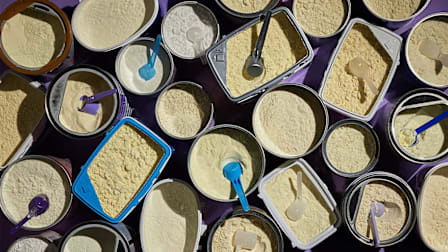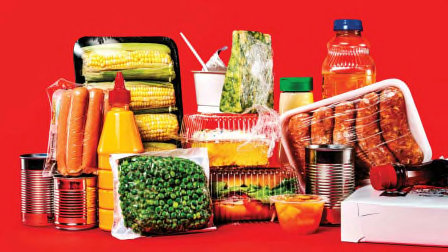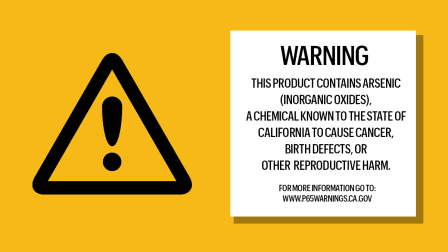State Officials File Action for FDA to Get Heavy Metals out of Baby Food ASAP
Some baby foods have alarmingly high levels of heavy metals like arsenic and lead. Attorneys general from 23 states say the FDA must act faster to reduce risk.

New York State Attorney General Letitia James, along with attorneys general from 22 other states, filed a petition Oct. 21 to request that the Food and Drug Administration speed up its plan to set limits on the levels of heavy metals like lead, cadmium, and inorganic arsenic in baby food.
The petition—which the FDA has 180 days to respond to—also asks the agency to instruct manufacturers to test finished baby food products, not just their ingredients, because testing the latter underestimates heavy metal levels. And the FDA should lower the one limit it does have for heavy metals in baby food, a limit on the amount of inorganic arsenic allowed in rice cereal, according to the group.
If the FDA denies the petition, the group of attorneys general could file a lawsuit.
An ‘Expedited, Science-Based Approach’
In April, the FDA outlined its Closer to Zero plan, meant to address the issue. The agency said it would propose limits for lead and arsenic in baby food in 2022, and then finalize the limit on lead by April 2024 and the arsenic limit sometime after that. The agency said it would propose limits on cadmium in mercury sometime after April 2024 as well.
While experts praised action by the agency, many called the timeline too slow—which is what today’s petition aims to address. James and other attorneys general want the FDA to propose its limits on arsenic, lead, cadmium, and mercury by April 2022 at the latest.
“It is becoming increasingly evident that the timelines outlined by the FDA in its Closer to Zero plan for addressing this critical public health issue are inadequate,” says Brian Ronholm, director of food policy for CR. “Consumer Reports strongly supports the expedited, science-based approach called for in Attorney General James’ petition, which offers a much-needed path to ensuring the safety of the baby food parents and caregivers serve their children every day.”
The Congressional reports also showed how a common practice among baby food manufacturers, the testing of product ingredients instead of finished products, consistently underestimates the level of heavy metals in food.
Another concern is making sure the limits set by the FDA are sufficiently protective. Currently, the only FDA limit on metals in baby food is a 100-part-per-billion limit for inorganic arsenic in infant rice cereal. Many experts say that is still too high because it was set based on cancer risk and still allows for levels of arsenic that could endanger cognitive development. The petition asks the FDA to set a lower limit for inorganic arsenic.
The FDA is reviewing the petition and will respond directly to the petitioner, an FDA spokesperson told CR in a statement. “Since laying out our Closer to Zero plan in April, the FDA continues to make steady progress towards developing action levels for lead in foods and evaluating the science to establish reference levels for arsenic and cadmium first,” the spokesperson said. “We have continued our sampling to help inform our process to set levels, and we are working to strengthen our relationships with federal partners, industry and advocates to ensure that we make meaningful and lasting reductions in exposure to toxic elements from foods.”
Since the first subcommittee report, several baby food manufacturers, including Beech-Nut, have stopped selling infant rice cereal because of challenges obtaining rice with low enough levels of arsenic. Beech-Nut announced it was exiting the market at the same time as it recalled its Single Grain Rice Cereal.
On Oct. 20, after Walmart recalled its Parent’s Choice infant rice cereal, Consumer Reports wrote letters to executives at Earth’s Best, Gerber, and Walmart, asking these companies to suspend sales of infant rice cereals until a more protective health standard is in place for these products.
In response, Walmart senior vice president Scott Morris told CR that the company currently has no plans to restock its Parent’s Choice rice cereal. But the retailer does plan to continue offering rice cereal products sold by Gerber and Earth’s Best. Certain states require retailers to stock rice cereal to participate in the Women, Infants, and Children (WIC) nutrition program, according to Morris.
Earth’s Best and Gerber both tell CR that they plan to continue selling infant rice cereal. But Earth’s Best has “reduced the amount of naturally occurring heavy metals in our Earth’s Best Organic Infant Rice Cereal and our Earth’s Best portfolio more broadly,” says Raul Fajardo, senior vice president at the Hain Celestial Group, which own’s Earth’s Best. Gerber president and CEO Tarun Malkani says it now tests ingredients used in its rice cereals as well as the finished products, and is also funding research into ways to reduce arsenic.
It’s possible to create baby food with lower levels of heavy metals, according to testing by Consumer Reports and other organizations, which has found that at least some baby foods have little or no detectable levels of heavy metals. This adds to the stack of evidence that shows the U.S. can and should take stronger action to protect infants, Ronholm says.
In the meantime, CR experts say that parents can help protect kids by limiting intake of the highest-risk foods, such as rice, sweet potatoes, and fruit juice. Varying foods can help ensure that kids get all the nutrients they need without getting too many heavy metals from one food in particular. Other whole grains, like oatmeal, tend to have lower heavy metal levels when compared with rice.
Editor’s Note: This story was updated to include more information from the FDA, Earth’s Best, Gerber, and Walmart.




